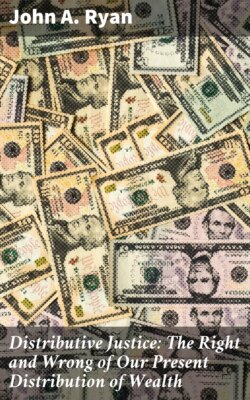Читать книгу Distributive Justice: The Right and Wrong of Our Present Distribution of Wealth - John A. Ryan - Страница 24
На сайте Литреса книга снята с продажи.
The Socialist Proposals Impracticable
ОглавлениеTable of Contents
As now existing and as commonly understood, private landownership comprises four elements which are not found together in either Socialism or the Single Tax. They are: security of possession combined with the power to transfer and transmit; the use of land combined with the power to let the use to others; the receipt of revenue from improvements in or upon the land; and the receipt of economic rent, the revenue due to the land itself, apart from improvements. In its extreme form, and as formerly understood by the majority of its authoritative exponents, Socialism would take from the individual all of these elements or powers. The State, or the Collectivity, would own and manage all productive land and land-capital, and would receive and distribute the product. Consequently the cultivators of the land would be deprived of even that limited degree of control which is now possessed by the tenant on a rented farm; for the latter, though not a landowner, is the owner of a farming business, and of agricultural instruments of production. Under Socialism the users of the land would not receive the revenue either from improvements or from the land itself. They would be substantially employés of the community, receiving a share of the product according to some plan of distribution established by public authority. Land occupied by dwellings would likewise be owned and managed by the State, although its product, the benefit of its use, would necessarily go in the first instance to the occupier. In return for this benefit he would undoubtedly be required to pay some kind of rent to the State.
Now the majority of persons believe that this system of land tenure would be inferior to private ownership, both as regards individual welfare and social welfare. The reasons for this belief will be given in detail in the chapter on "The Socialist Scheme of Industry." For the present it will be sufficient to point out in a summary way that Socialism would be unable to organise and carry on efficiently all agricultural and extractive industries, either under one central direction or under many provincial authorities; that it could not adjust wages and salaries satisfactorily, nor give the individual worker an incentive as effective as the self interest that goes with private ownership; that it would deprive the worker of a great part of the freedom that he now enjoys in the matters of occupation and residence; that it would leave to the consumer less choice in the demand for the products of land; that it would place all the people in a position of dependence upon a single agency for all these products; and that it would make all land users, whether as workers or as residents, tenants-at-will on the property of the State.
From the nature of the case, none of the foregoing propositions can be demonstrated mathematically. Nevertheless they are as nearly evident as any other practical conclusions which are based upon our general experience of human nature, its tendencies, and its limitations. At any rate, the burden of proof is upon the advocates of the new system. Until they have assumed and satisfactorily disposed of this burden, we are justified in rejecting their prophecies, and in maintaining the superiority of private ownership.[27]
To-day, however, many Socialists, possibly the majority of them in some countries, would reject the extreme form of land socialisation discussed in the preceding paragraphs. "The nearest approach which Socialists have made to a volte face since Marx, has been in relation to Agrarianism.... Marx thought that the advantage of concentrating capital would be felt in agriculture as in other industries; but, in spite of a temporary confirmation of this view by the mammoth farms which sprang up in North America, it now appears very doubtful.... Recognition of this has led reformists to substitute a policy of actively assisting the peasants for the orthodox policy of leaving them to succumb to capitalism. Their formula is: 'Collectivise credit, transport, exchange, and all subsidiary manufacture, but individualise culture.'"[28] The Belgian Socialist leader, Vandervelde, seems to prefer State ownership and management of the great agricultural industries which require large masses of capital for their efficient operation, such as dairying, distilling, and sugar making, together with State ownership of the land thus used. Other lands he would have owned by the State, but cultivated by individuals according to a system of leasing and rent-paying.[29] By a referendum vote the members of the Socialist party in the United States recently amended their platform on land, to read as follows: "The Socialist party strives to prevent land from being used for the purpose of exploitation and speculation. It demands the collective possession, control or management of land to whatever extent may be necessary to attain that end. It is not opposed to the occupation and possession of land by those using it in a useful and bona fide manner without exploitation."[30] As to land occupied by dwellings, perhaps the majority of Socialists would now agree with Spargo in the statement that, "so far as the central principle of Socialism is concerned, there is no more reason for denying the right of a man to own his own home than there is to deny him the right to own his hat."[31]
In so far as the foregoing modifications of Socialist proposals would allow the individual to own the land that he cultivates or occupies, they do not call for further discussion here. In so far as they combine State ownership of land with individual management of cultivation, they are subject to at least all the limitations of the Single Tax. To the latter system we now turn our attention.
